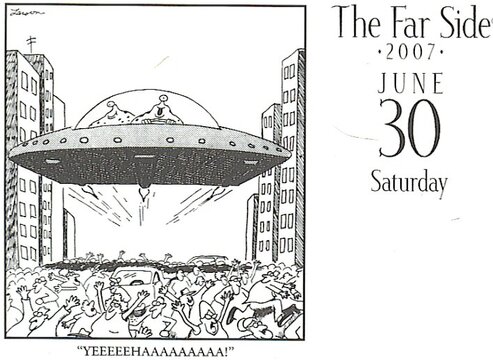[As an aside, I asked my mother about this event and how she remembered the WofTW broadcast and she remembered that people were excited about it during the broadcast, but quickly realized it was fiction. I recommend reading the full article. Need I mention that the media today, still has tremendous power to manipulate history and spin current events —chris]
ARTICLE HERE
By Jefferson Pooley
Wednesday marks the 75th anniversary of Orson Welles’ electrifying War of the Worlds broadcast, in which the Mercury Theatre on the Air enacted a Martian invasion of Earth. “Upwards of a million people, [were] convinced, if only briefly, that the United States was being laid waste by alien invaders,” narrator Oliver Platt informs us in the new PBS documentary commemorating the program. The panic inspired by Welles made War of the Worlds perhaps the most notorious event in American broadcast history.
That’s the story you already know—it’s the narrative widely reprinted in academic textbooks and popular histories. With actors dramatizing the reaction of frightened audience members (based on contemporaneous letters), the new documentary, part of PBS’s American Experience series, reinforces the notion that naïve Americans were terrorized by their radios back in 1938. So did this weekend’s episode of NPR’s Radiolab, which opened with the assertion that on Oct. 30, 1938, “The United States experienced a kind of mass hysteria that we’ve never seen before.”
There’s only one problem: The supposed panic was so tiny as to be practically immeasurable on the night of the broadcast. Despite repeated assertions to the contrary in the PBS and NPR programs, almost nobody was fooled by Welles’ broadcast.
How did the story of panicked listeners begin? Blame America’s newspapers....
REST OF ARTICLE HERE (Highly Recommended!)
ARTICLE HERE
By Jefferson Pooley
Wednesday marks the 75th anniversary of Orson Welles’ electrifying War of the Worlds broadcast, in which the Mercury Theatre on the Air enacted a Martian invasion of Earth. “Upwards of a million people, [were] convinced, if only briefly, that the United States was being laid waste by alien invaders,” narrator Oliver Platt informs us in the new PBS documentary commemorating the program. The panic inspired by Welles made War of the Worlds perhaps the most notorious event in American broadcast history.
That’s the story you already know—it’s the narrative widely reprinted in academic textbooks and popular histories. With actors dramatizing the reaction of frightened audience members (based on contemporaneous letters), the new documentary, part of PBS’s American Experience series, reinforces the notion that naïve Americans were terrorized by their radios back in 1938. So did this weekend’s episode of NPR’s Radiolab, which opened with the assertion that on Oct. 30, 1938, “The United States experienced a kind of mass hysteria that we’ve never seen before.”
There’s only one problem: The supposed panic was so tiny as to be practically immeasurable on the night of the broadcast. Despite repeated assertions to the contrary in the PBS and NPR programs, almost nobody was fooled by Welles’ broadcast.
How did the story of panicked listeners begin? Blame America’s newspapers....
REST OF ARTICLE HERE (Highly Recommended!)

 the thing is while I don't dispute the article's points, I instinctively "knew"...for lack of a better word....that the retelling of the event would be bound to exaggerate events as this is pretty much the norm in many "historical" events given the passages of time. The thing is I always felt that given the current situation, it could have very well been true that the country was in a position to be antsy. I'd be surprised if they weren't. I've always been more fascinated by the assertion of the radiolab program, the link which I posted elsewhere, that this event was reproduced 2 more times in our era...buffalo and Ecuador if I recall...when people should know better and there was no extenuating circumstances to merit ANY kind of panic
the thing is while I don't dispute the article's points, I instinctively "knew"...for lack of a better word....that the retelling of the event would be bound to exaggerate events as this is pretty much the norm in many "historical" events given the passages of time. The thing is I always felt that given the current situation, it could have very well been true that the country was in a position to be antsy. I'd be surprised if they weren't. I've always been more fascinated by the assertion of the radiolab program, the link which I posted elsewhere, that this event was reproduced 2 more times in our era...buffalo and Ecuador if I recall...when people should know better and there was no extenuating circumstances to merit ANY kind of panic


 but fantastic overall !
but fantastic overall ! 